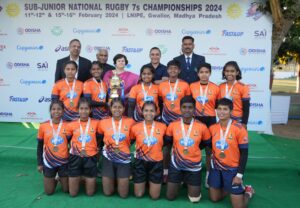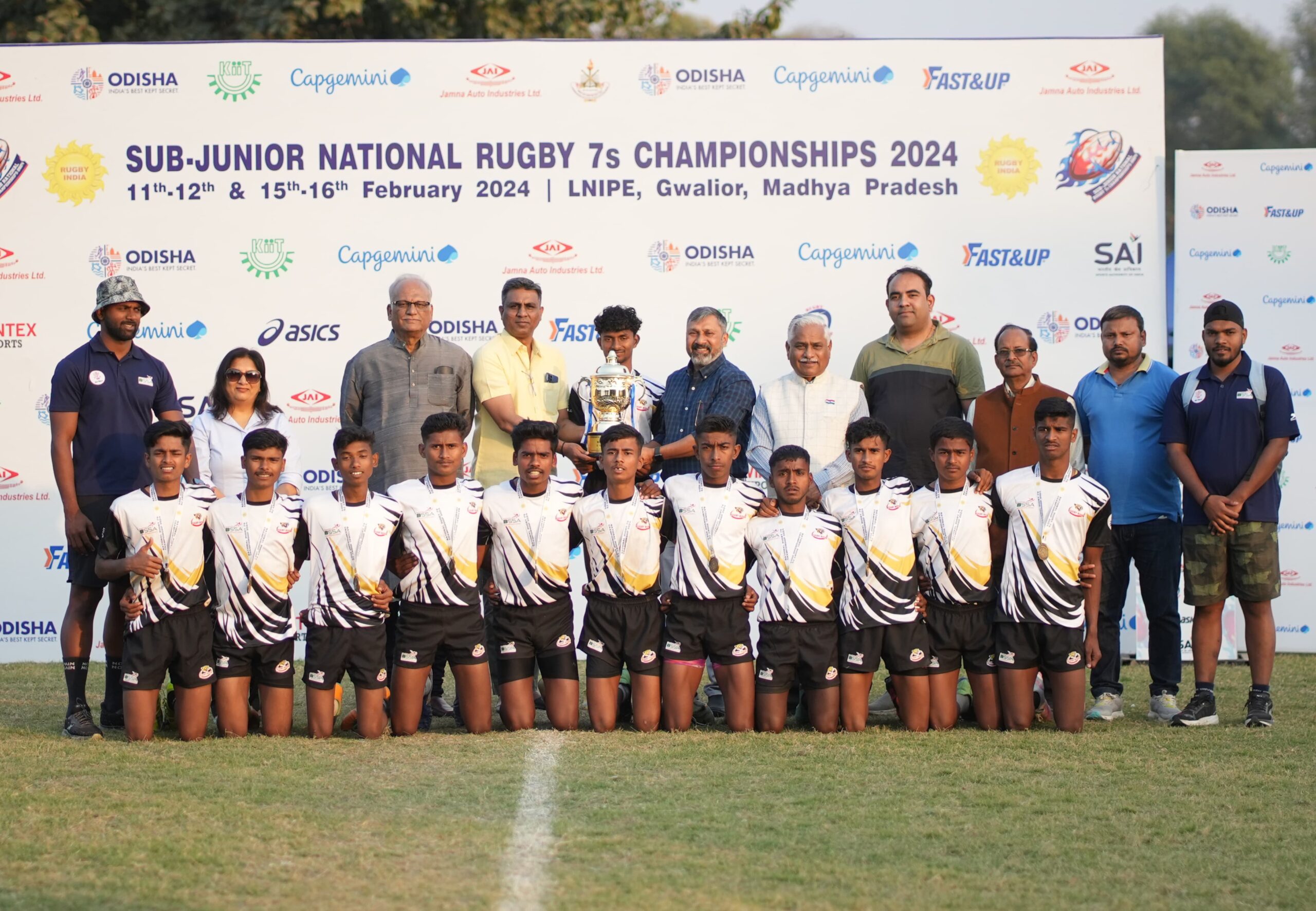February 17, 2025: Gwalior, Madhya Pradesh: The Sub-Junior National Rugby Sevens Championship 2024, conducted by the Indian Rugby Football Union (IRFU) at the Lakshmibai National Institute of Physical Education (LNIPE), Gwalior, concluded with Maharashtra (Girls) and Bihar (Boys) crowned national champions. The event, held in two phases-February 11-12 for U15 Girls and February 15-16 for U15 Boys-brought together 21 teams from across the country and marked a major step forward in the evolution of grassroots rugby in India.
In a landmark moment for the tournament, the 2024 edition introduced full-contact rugby at the sub-junior level for the first time, replacing the non-contact format of previous years. The transition is in line with IRFU’s long-term vision to strengthen its age-grade teams for international competition and ensure earlier exposure to the dynamics of the 7s format.
The U15 Girls competition saw a breakthrough performance from Maharashtra, who defeated defending champions Bihar 17-5 in the final to lift their maiden sub-junior title. The win was anchored by standout performances from Shravani Patil, who finished as the tournament’s top try scorer with 14 tries, and a solid team display across both attack and defence. Maharashtra had earlier beaten Delhi 27-10 in the semifinal, while Bihar advanced with a 20-5 win over Rajasthan. Delhi went on to claim bronze, defeating Rajasthan in the third-place playoff.
 Joining Shravani Patil in the list of emerging talent from the girls’ tournament were Komal Kumari (Bihar), Niha (Kerala), and Chahat (Chandigarh)-players who have already demonstrated the promise and skill required to represent India at higher levels of the game. With this victory, Maharashtra’s sub-junior girls have positioned themselves as strong contenders for the national pathway, having gained early exposure to contact rugby in a competitive setting.
Joining Shravani Patil in the list of emerging talent from the girls’ tournament were Komal Kumari (Bihar), Niha (Kerala), and Chahat (Chandigarh)-players who have already demonstrated the promise and skill required to represent India at higher levels of the game. With this victory, Maharashtra’s sub-junior girls have positioned themselves as strong contenders for the national pathway, having gained early exposure to contact rugby in a competitive setting.
In the U15 Boys category, Bihar continued their dominance at the age-group level, finishing unbeaten and clinching the national title with a commanding 29-0 win over Rajasthan in the final. The side showcased physicality, speed, and structured execution throughout the competition. Bihar reached the final after a convincing 39-0 semifinal win over Kerala, while Rajasthan overcame Maharashtra 17-10 in a close semifinal. Maharashtra secured the bronze medal, with Kerala finishing fourth.
Both tournaments followed a 7-pool format in the group stages, with top teams advancing through a series of knockout rounds. The competition format ensured equal opportunity for teams from all regions, encouraging depth and exposure at the grassroots level.
Here are the final standings.
| Rank | Girls | Boys |
| 1 | Maharashtra | Bihar |
| 2 | Bihar | Rajasthan |
| 3 | Delhi | Maharashtra |
| 4 | Rajasthan | Kerala |
| 5 | Kerala | Punjab |
| 6 | Gujarat | Uttar Pradesh |
| 7 | Haryana | Uttarakhand |
| 8 | Chhattisgarh | Goa |
| 9 | Karnataka | Jharkhand |
| 10 | Madhya Pradesh | Delhi |
| 11 | Chandigarh | Chhattisgarh |
| 12 | Punjab | Gujarat |
| 13 | Uttar Pradesh | Manipur |
| 14 | Uttarakhand | Madhya Pradesh |
| 15 | Manipur | Karnataka |
| 16 | Jammu & Kashmir | Andhra Pradesh |
| 17 | Assam | Assam |
| 18 | Tamil Nadu | Chandigarh |
| 19 | Jharkhand | Tamil Nadu |
| 20 | Andhra Pradesh | Jammu & Kashmir |
| 21 | Goa | Haryana |
